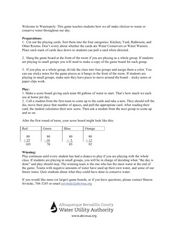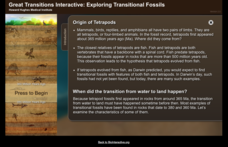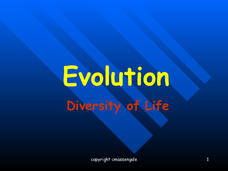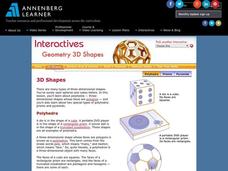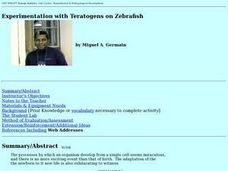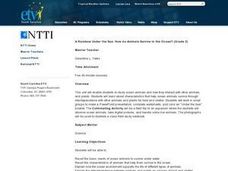Curated OER
Wateropoly: Life in the Desert
Students explore water properties by participating in a drought related board game. In this water conservation lesson, students play a game titled "wateropoly" which is based on the classic board game Monopoly. Students utilize cards and...
Consortium for Ocean Science Exploration and Engagement (COSEE)
Life in an Ocean World
How does the shell color of crabs and the habitat they live in impact the predator-prey relationship? The fourth lesson in a series of five is a game where participants try not to get eaten if they are a prey and try to eat if they are...
Sea World
Marine Animal Husbandry and Training
Step into the role of a zoo director with several activities about animal training and running a zoo. Kids calculate the amount of food each animal needs, design a habitat for penguins, decide how to breed bottlenose dolphins, and train...
Curated OER
DNA, the Awesome Thread of Life
Students examine how traits are passed to offspring. In this genetic reproduction lesson students develop a model of dna and learn about its structure, replication and function.
Pearson
The Chemical Context of Life
An educational presentation includes atoms, molecules, the four major elements, as well as neutrons and protons. Additionally, slides focus on atomic number, mass number, atomic weight, polar and nonpolar covalent bonding, ionic...
Howard Hughes Medical Institute
Great Transitions Interactive
How did life evolve from fish to four-limbed animals? Work through an interactive exploring transition animals and comparing their features to understand the transition. Making it even better, the interactive allows scholars to isolate...
Biology Junction
Evolution – Diversity of Life
Scientists noticed animals with backbones share similar bone structure despite having different forms, such as fins, arms, and wings. Young scientists gain an appreciation for evolution by understanding the history of the theory. They...
Curated OER
Masks of Many Cultures: Celebrations of Life
Bring art and society together with this highly creative and interesting lesson. Learners research various uses of masks in ceremonies. They then create a ceremony of their own and a mask to go along with it. They film themselves...
Curated OER
Old McDonald Dice
Old McDonald had a...die with different barnyard animals on it! This fun template will put a new spin on the classic children's song by letting the roll of a die determine which verse to sing next. Consider printing the dice on card...
Sea World
Seals, Sea Lions, and Walruses
Learn about the mammals of the sea with a lesson about seals, sea lions, and walruses. Kids study the characteristics of each pinniped with flash cards and information, and then analyze data about elephant seals, measure heat loss...
Fall River Schools
Parabolas Are All Around Us
Moving parabolas off of graph paper and into the real world is the task at hand in this detailed poster project. First, learners perform a cumulative activity identifying many characteristics of an assigned quadratic equation. Next, they...
Autism Speaks
Tips for working with participants with Autism
Everyday life can be overwhelming for a student with autism spectrum disorder. An informative presentation guides teachers through definitions of common attributes associated with autism, as well as ways to meet sensory needs to...
Annenberg Foundation
Geometry 3D Shapes: 3D Shapes
Explore vocabulary related to three-dimensional shapes. An instructional website describes the characteristics of different geometric solids. Learners can use an interactive component to view nets, faces, vertices, and edges of common...
Mathematics Vision Project
Module 7: Trigonometric Functions, Equations, and Identities
Show your class that trigonometric functions have characteristics of their own. A resource explores the features of trigonometric functions. Learners then connect those concepts to inverse trigonometric functions and trigonometric...
Captioned Media
Creating Dramatic Monologues from The Grapes of Wrath
Set in Oklahoma in the 1930s, The Grapes of Wrath presents a powerful view of life during the Great Depression. An insightful lesson plan takes a closer look at the characters in John Steinbeck's classic novel, combining the...
Biology Junction
Arthropods
Even the creepy crawlers have pretty amazing anatomy! A thorough lesson describes characteristics of arthropods with an emphasis on their structures. Beginning with a review of the taxonomy hierarchy, the lesson explains the different...
Reed Novel Studies
Rules: Novel Study
Have you ever been so focused on others, that a look in the mirror surprises you? It seems that Catherine, a character in Rules, does just that when she focuses so much on her autistic brother's behaviors that she is surprised by her own...
Curated OER
Animals
Second graders define and describe the characteristics of a mammal and a mammal's importance to man. They also describe the life cycle of a frog and compare and contrast a larva and an adult frog. Finally, 2nd graders study and explain...
Curated OER
Experimentation with Teratogens on Zebrafish
Students compare mitosis and meiosis with regard to chromosome number in parent cells versus daughter cells, types of cells produced, total number of cells produced, and the number of divisions. In groups, identify and differentiate the...
Curated OER
A Rainbow Under the Sea: How do Animals Survive in the Ocean?
Second graders read books, watch videos, complete worksheets and participate in class discussions about ocean animals. They, in groups, design PowerPoint presentations on selected marine animals.
Curated OER
Interesting Insects
Students discover the characteristics of insects. They explore insects through cooperative learning, group projects, hands on activities, and poetry. They gain knowledge of insect life cycles, habitat, and physical characteristics.
Curated OER
Butterfly Round-Up
Students classify the characteristics of butterflies and moths moths. In this life cycle lesson, students identify butterflies and moths common in the state of Iowa as well as their characteristics. Students then learn the proper...
Curated OER
Introduction To Acrylic Painting and the Work of Wayne Thiebaud
Seventh graders explore the basics of composition, acrylic painting techniques, and color theory, examine works of the American painter Wayne Thiebaud, and create still lifes using three pieces of candy.
Curated OER
Out of the Deep
Young scholars observe, describe, and record characteristics of ocean animals (mammals and fish) and sea shells. They conduct an experiment comparing and contrasting sugar water, salt water and fresh water and create a mural of coral...
Other popular searches
- 6 Characteristics of Life
- 7 Characteristics of Life
- The Characteristics of Life
- Characteristics of Life Labs
- Life Characteristics
- Life Characteristics Biology
- Basic Characteristics of Life


